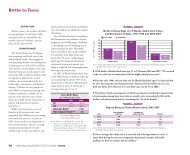2010 Rhode Island Kids Count Factbook
2010 Rhode Island Kids Count Factbook
2010 Rhode Island Kids Count Factbook
Create successful ePaper yourself
Turn your PDF publications into a flip-book with our unique Google optimized e-Paper software.
Children of Incarcerated Parents<br />
DEFINITION<br />
Children of incarcerated parents is the<br />
number of children reported by parents<br />
serving sentences at the <strong>Rhode</strong> <strong>Island</strong><br />
Department of Corrections per 1,000<br />
children under age 18. The data are<br />
reported by the place of the parent’s last<br />
residence before entering prison.<br />
SIGNIFICANCE<br />
Approximately 1.7 million children<br />
in the U.S. have a parent incarcerated<br />
in state or federal prison, and a quarter<br />
of minor children with a parent in<br />
prison are under age five. 1 Having an<br />
incarcerated parent can negatively<br />
impact the quality of a child’s<br />
attachment to their parent and can lead<br />
to anxiety, withdrawal, hyper-vigilance,<br />
and other reactive behaviors. 2<br />
As a result of parental incarceration,<br />
children may experience disruptions in<br />
their homes, temporary caregivers or<br />
placements in foster care, financial<br />
hardship and an increased risk of child<br />
abuse and neglect. 3 Compared to other<br />
children, children of incarcerated<br />
parents also are at greater risk for poor<br />
academic achievement, aggressive<br />
behavior, and housing instability. 4,5,6<br />
Nationally, most children of<br />
incarcerated parents live with their other<br />
parent (84%), a grandparent (15%) or<br />
other relatives (6%). 7 Grandparents and<br />
other relative caregivers often experience<br />
significant economic hardship. They<br />
may not receive necessary supports or<br />
services because they are unaware that<br />
they are eligible, they are worried about<br />
stigma attached to receiving assistance,<br />
they have previously been denied<br />
benefits or because they wish to<br />
maintain their families' privacy. 8<br />
Children of incarcerated parents are<br />
more likely to be involved with the<br />
child welfare system. 9 These cases are<br />
some of the most complex cases child<br />
welfare agencies encounter. These<br />
children are generally exposed to more<br />
risk factors than other children,<br />
including parental substance abuse,<br />
mental illness, domestic violence and<br />
extreme poverty. 10<br />
In <strong>Rhode</strong> <strong>Island</strong> in 2009, more than<br />
two-thirds (67%) of incarcerated<br />
parents with a known in-state residence<br />
identified one of the core cities as their<br />
last place of residence. The rate of<br />
children of incarcerated parents in the<br />
core cities (18.8 per 1,000 children) is<br />
nearly four times the rate in the<br />
remainder of the state (5.1 per 1,000<br />
children). 11,12<br />
Of the 1,774 <strong>Rhode</strong> <strong>Island</strong> parents<br />
incarcerated on December 31, 2009,<br />
including those awaiting trial, 47%<br />
were White, 29% were Black, 22% were<br />
Hispanic, and 1% were Native<br />
American, Asian or another race. 13<br />
Parents at the <strong>Rhode</strong> <strong>Island</strong> Adult Correctional Institutions,<br />
December 31, 2009<br />
INMATES # REPORTING % REPORTING # OF CHILDREN<br />
SURVEYED* CHILDREN CHILDREN REPORTED<br />
Awaiting Trial 513 368 72% 846<br />
Serving a Sentence 2,138 1,406 66% 3,043<br />
Total Inmates 2,651 1,774 67% 3,889<br />
Source: <strong>Rhode</strong> <strong>Island</strong> Department of Corrections, December 31, 2009. *Does not include inmates who were missing<br />
responses to the question on number of children, inmates on home confinement or those from another state's jurisdiction.<br />
◆ Of the 2,651 inmates awaiting trial or serving a sentence who were surveyed as of<br />
December 31, 2009 and answered the question on number of children, 1,774 inmates<br />
reported having 3,889 children. The median length of sentence of inmates who reported<br />
having children was four years for males and one and a half years for females. 14<br />
◆ Of the 83 sentenced mothers on December 31, 2009, 37% were serving a sentence<br />
for a nonviolent offense, 30% for a violent offense, 20% for a drug offense, 11% for<br />
breaking and entering, and 1% for sex-related offenses. Of the 1,323 sentenced fathers,<br />
42% were serving sentences for violent offenses, 19% for drug offenses, 15% for<br />
nonviolent offenses, 15% for sex-related offenses, and 9% for breaking and entering. 15<br />
◆ In <strong>Rhode</strong> <strong>Island</strong> in 2009, 63% of the incarcerated parents awaiting trial or serving<br />
a sentence had less than a high school degree and 8% had less than a ninth-grade<br />
education. Thirty percent of the parents awaiting trial or serving a sentence had a high<br />
school diploma or a GED and 7% had some college education. 16 Inadequate education,<br />
poor housing, unemployment and poor health put parents at risk of incarceration. 17<br />
◆ For most incarcerated parents, a supportive family, education, job training, stable<br />
housing, employment assistance, medical assistance and substance abuse treatment<br />
support the well-being of their children and their successful transition to the community<br />
after incarceration. 18<br />
◆ Maintaining positive and healthy familial bonds between children and their<br />
incarcerated parents is crucial to children’s emotional well-being because it can reduce<br />
the negative effects children experience as a result of the parent’s absence. Preservation<br />
of this bond also can have positive effects on the rehabilitation of incarcerated parents. 19<br />
98 <strong>2010</strong> <strong>Rhode</strong> <strong>Island</strong> KIDS COUNT <strong>Factbook</strong> / Safety






